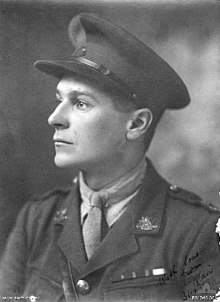Blair Anderson Wark | |
|---|---|
 Blair Wark c. 1919 | |
| Born | 27 July 1894 Bathurst, New South Wales |
| Died | 13 June 1941 (aged 46) Puckapunyal, Victoria |
| Allegiance | Australia |
| Service | Citizens Military Force (1913–15, 1940–41) Australian Imperial Force (1915–19) |
| Years of service | 1912–19 1940–41 |
| Rank | Lieutenant colonel |
| Commands | 32nd Battalion 1st Battalion |
| Battles / wars | |
| Awards | Victoria Cross Distinguished Service Order Mentioned in Despatches |
Blair Anderson Wark, VC, DSO (27 July 1894 – 13 June 1941) was an Australian recipient of the Victoria Cross, the highest decoration for gallantry "in the face of the enemy" that can be awarded to members of the British and other Commonwealth armed forces. A quantity surveyor and member of the Citizens Military Force, Wark enlisted in the Australian Imperial Force on 5 August 1915, for service in the First World War. After initially being employed in the defence of the Suez Canal, his battalion was shipped to the Western Front; it was here that Wark was twice decorated for his bravery and leadership. Having received the Distinguished Service Order in 1917 for his actions at the Battle of Polygon Wood, Wark was awarded the Victoria Cross in 1918 for his leadership and gallantry when in temporary command of his battalion over a three-day period, while conducting operations against the Hindenburg Line.
Returning to Australia after the war, Wark resumed work as a quantity surveyor and established his own business. He became a respected member of Australian society, holding positions and directorships in several companies and charities until 1940, when he re-enlisted in the Citizens Military Force for service in the Second World War. Wark was promoted to lieutenant colonel and assumed command of the 1st Battalion (City of Sydney's Own Regiment), but died suddenly at Puckapunyal Camp, Victoria, of coronary heart disease, aged 46.